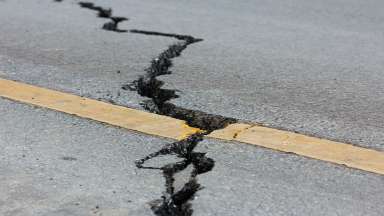Jump To:
Earthquakes are a sudden and violent shaking of the ground as a result in movements within the earth’s crust or volcanic action. Earthquakes strike suddenly and without warning, and they can occur at any time of the year and anywhere in the world.
Risks from earthquakes
- Destruction of buildings and infrastructure
- Landslides and rockfalls
Before an earthquake
- Be aware of evacuation plans for all the buildings you regularly occupy.
- Bolt and brace water heaters and gas appliances to wall studs.
- Bolt book cases and other tall furniture to wall studs.
- Hang heavy items (mirrors, pictures, etc.) away from beds or couches.
- In cabinets and cupboards, place heavy items nearest the floor.
During an earthquake
- Drop, cover and hold on. Sit on the floor next to an interior wall and cover your head and neck with your arms.
- Move as little as possible.
- Stay in place until shaking stops. If you must leave the building, use stairs, not elevators.
- If you are outside, find a clear spot away from trees, buildings, power lines and streetlights and drop to the ground. Stay there until shaking stops.
- If you are in a vehicle, pull over to a clear location and stop. Avoid bridges, overpasses, and power lines.
After an earthquake
- Expect and prepare for aftershocks or landslides.
- Check yourself and those around you for injuries. Get first aid if necessary.
- Wear long pants and long sleeves when working around debris to protect against injury from broken glass or other objects.
- Look for and extinguish any small fires that occur.
- Clean up spilled medications, bleach, gasoline, or other flammable liquids immediately.
- Take care when opening closets and cabinets; items may have shifted.
- Watch out for fallen power lines or broken gas lines.
- Evacuate and stay clear of damaged buildings and infrastructure.
- Take care when driving and anticipate traffic signal outages.
Resources
Earthquake Safety Tips from Ready.gov
